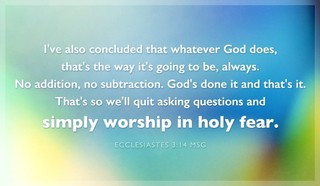
- Recent Translations
- All Translations
Ecclesiastes 3:18
Share
Settings
Ecclesiastes 3:18 Meaning and Commentary
I said in mine heart concerning the estate of the sons of
men
He thought of the condition of the children of men, their sinful and polluted state; he weighed and considered in his mind their actions, conversation, and course of life; and was concerned how it would go with them at the day of judgment on account of the same. Some render it, "I said in mine heart after the speech of the children of men" F18; speaking in their language, and representing the atheist and the epicure, as some think the wise man does in the following verses; though he rather speaks his own real sentiments concerning men, as they are in their present state, and as they will appear in the day of judgment; that God might manifest them;
or "separate them" F19; as the chaff from the wheat, and as goats from the sheep; as will be done at the day of judgment, ( Matthew 3:10 ) ( Matthew 25:30 Matthew 25:33 ) ; or "that they might clear God" F20; as they will, when he shall judge and condemn them; and that they might see that they themselves are beasts;
as they are through the fall, and the corruption of nature, being born like the wild ass's colt, stupid, senseless, and without understanding of spiritual things; nay, more brutish than the beasts themselves, than the horse and the mule that have no understanding, ( Psalms 32:9 ) ; "mulo inscitior", as is Plautus's F21 phrase; see ( Psalms 49:12 Psalms 49:20 ) ( Job 11:12 ) ( Isaiah 1:3 ) ( Jeremiah 8:7 ) ; this is now made manifest to the people of God by the word and Spirit; is seen, known, and acknowledged by them, ( Psalms 73:21 ) ( Proverbs 30:2 ) ; and the wicked themselves will see, know, and own what beasts they are and have been, at the day of judgment; how they have lived and died like beasts; how like brute beasts they have corrupted themselves in things they knew naturally; and that as natural brute beasts, made to be taken and destroyed, spoke evil of things they understood not, and perished in their own corruption, ( Jude 1:10 ) ( 2 Peter 2:12 ) ; and that they have been beasts to themselves, as Jarchi renders and interprets it; made beasts of themselves by their brutish gratifications; have been cruel to themselves, ruining and destroying their own souls; or among themselves, and to one another, "homo lupus homini"; hence wicked men are compared to lions, foxes, evening wolves, vipers, and the like. So Mr. Broughton renders it, "how they are beasts, they to themselves."
F18 (Mdah ynb trbd le) "super verbum filiorum Adam", Montanus; "verbis hominum", Arabic and Syriac versions.
F19 (Mrbl) (oti diakrinei autouv) "ut discernat illos", Cocceius; "quia delegit eos", some in Vatablus; so Aben Ezra and Ben Melech.
F20 "Ut ipsi expurgent Deum", Anglic. in Reinbeck; some in Rambachius render it thus, "ut seligant ipsi (homines) Deum"; so Varenius.
F21 Cisteilaria, Act. 4.

